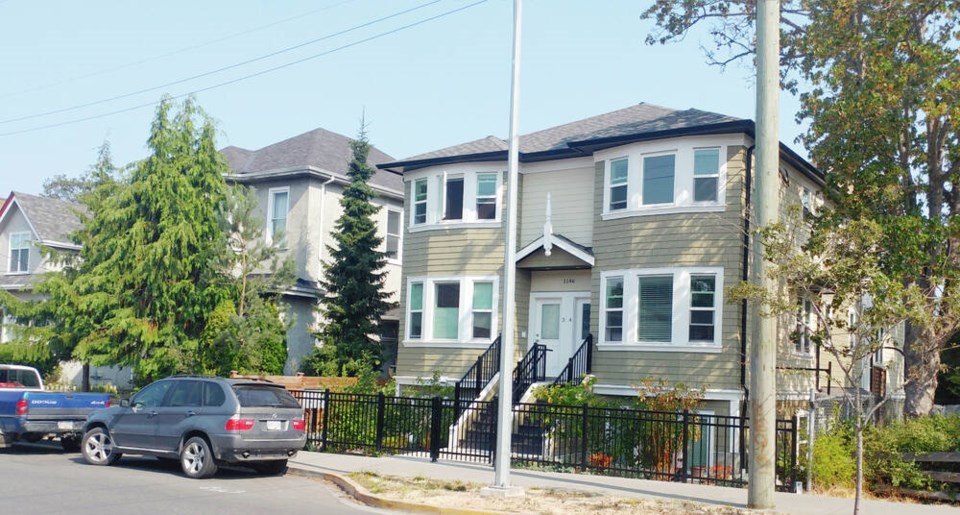A decision on whether the City of Victoria will make it easier to redevelop land and build houseplexes and townhomes in its neighbourhoods will have to wait until next week.
Saying it would not be good governance to extend deliberations over the missing-middle housing initiative into a Friday evening before a long weekend, council voted to adjourn debate until the next regular council meeting Sept. 8.
Mayor Lisa Helps said it was likely the debate over the controversial land-use policy would drag well into the night, given the intense interest in the topic.
The missing-middle initiative, which aims to increase the number of housing options in the middle ground between single-family homes and apartment or condo towers, has sparked fierce debate through a public hearing that had to be spread over three days because of the sheer number of people wanting to have their say.
The hearings, which wrapped up Friday with 90 minutes of pre-recorded submissions from Victoria residents, painted a picture of a deeply divided city when it comes to the largest overhaul of the city’s residential zoning process ever undertaken.
The initiative requires amending bylaws, land-use procedures and official community plans to permit infill, houseplexes and corner townhouses where zoning currently only allows for single-family homes, and would allow houseplexes as well as townhouse projects on assembled land.
The initiative would also allow city staff to greenlight permits for projects that comply with all design guidelines and zoning without having to get council approval. Advocates believe that will mean projects are done more quickly and at a lower cost.
The idea of new developments being built without the neighbourhood having a say has spurred many residents to suggest the missing-middle program should be scrapped.
Several residents said developers would be given carte blanche to build whatever they want on what have traditionally been single-family lots.
Others argue that community engagement on the proposal has not been robust enough, and that the initiative does nothing to improve affordability, will reduce green space and could displace renters as older homes with suites could be demolished to make way for large houseplexes.
Former Victoria mayor Alan Lowe went as far as to say if the initiative was approved, “the traditional single-family neighborhood, as we know it today, will no longer exist.”
“The silent majority in this city will not even be aware of how this missing-middle housing initiative will affect their neighborhoods until the first project starts to be built in their neighborhood,” he said. “If this initiative is approved, most residents will be shocked at what this initiative will allow next door to them without having the right for any input at that time.”
Lowe, like many who opposed the program, said there are some worthwhile measures in the initiative, such as reducing red tape and relaxing requirements for rezoning, but he said blanket rezoning of all neighbourhoods goes too far.
But the public hearings, which started in early August, have attracted as many people who are in favour as against it.
Many of those speaking for the initiative were younger residents frustrated by the lack of housing options available for students and those starting families.
They say many young families have grown out of small apartments and need something bigger, but can’t handle the out-of-reach pricetag of single-family homes.
While acknowledging that options such as townhouses and houseplexes won’t necessarily be affordable, students said they could spur some renters to move up, freeing more affordable suites.
Samuel Holland, a University of Victoria student, told council Thursday that while the initiative is far from perfect, it’s a step in the right direction.
“Every study I have ever read about housing affordability clearly demonstrates that the only way to make housing more affordable is to build more housing, full stop,” he said. “Over-regulation created this crisis and the only way out of it is to allow housing to be built.
“This policy isn’t just for us now — it’s for those of us who still hold some small hope of secure housing, when we become working professionals, for those that dare dream of raising a family in this city.”
Holland said young people are tired of watching “a few anti-housing cranks rally and win victory after victory against affordability” by blocking construction of housing.
“We have heard a lot of folks say that missing middle is not going to provide housing for students. And those people are wrong because missing middle will provide housing for the young professionals and tradespeople that students are currently competing with in an extremely tight housing market,” he said.



